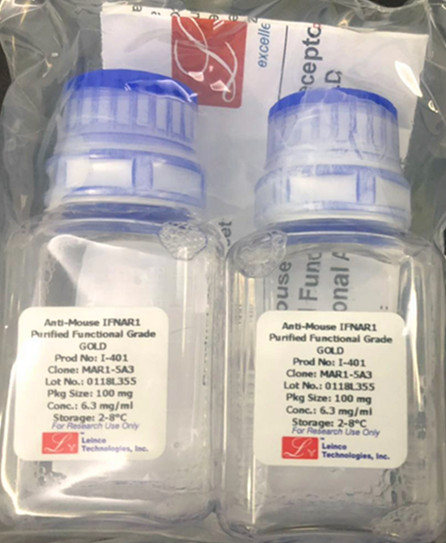|
Prod. No.: |
I-401 |
|
Clone: |
MAR1-5A3 |
|
Isotype: |
Mouse IgG1 |
|
Conc.: |
≥1.0 mg/ml |
|
Pkg. Size: |
0.5 mg, 1.0 mg, 5.0 mg, 25 mg, 100 mg |
|
Starting at: |
$98.00 |
|
Availability: |
In Stock |
|
Storage: |
Sterile 2-8°C Detailed storage instructions below. |
Description
Specificity:
Mouse Anti-Mouse IFNAR1 (Clone MAR1-5A3) recognizes the extracellular domain of the IFNAR1 subunit of the mouse IFN-α/β receptor.
Antigen Distribution:
IFNAR1 and IFNAR2 are coexpressed on nearly all cells.
Background:
The antibody when prepared specifically for In vivo functional assays blocks type I IFN receptor signaling both In vitro and In vivo without depleting IFNAR1 bearing cells. This antibody was produced by In vivo genetic immunization of IFNAR1 knockout mice with a plasmid encoding the extracellular domain of murine IFNAR1. IFNAR1 and IFNAR2 are coexpressed on nearly all cells and make up the heterodimeric receptor that binds all type I IFNs (IFN α and β). Type I IFNs are a family of cytokines that have been shown to promote anti-viral, anti-microbial, anti-tumor and autoimmune responses In vivo.
Known Species Cross Reactivity: Ms+, Hu-
Host Species
Mouse
Immunogen
This antibody was produced by In vivo genetic immunization of IFNAR1 knockout mice with a plasmid encoding the extracellular domain of murine IFNAR1.
Formulation
This antibody is aseptically packaged and formulated in 0.01 M phosphate buffered saline (PBS) pH 7.2, 150 mM NaCl with no carrier protein, potassium or preservatives added.
Purity
>98% by SDS-PAGE and HPLC
Endotoxin
<0.5 EU/mg as determined by the LAL method
Storage and Stability
This antibody is stable for at least one week when stored sterile at 2-8°C. For long term storage aseptically aliquot in working volumes without diluting and store at –20°C in a manual defrost freezer. Avoid Repeated Freeze Thaw Cycles.
Reported Applications
FC, N, IP, WB, B
Blocking: Clone MAR1-5A3 has a short half-life, basically because every cell expresses the IFNAR1 receptor and the receptor recycles very rapidly. And, if you want to block function in vivo, you need to be sure that all of the receptors are blocked continually in all compartments. Therefore, you need a large in vivo loading dose (2.5 mg/mouse) to saturate all the binding sites in vivo and then maintain a high enough level to keep them saturated. For in vivo blocking studies we recommend give a loading dose of 2.5 mg/mouse and follow with a weekly dose of 0.5 mg/mouse. The half-live following a 2.5 mg loading dose is about 5 days. [However, if you only inject a low dose of 250 micrograms, then the half life is 1.5 days – because you haven’t saturated the mouse].
Each investigator should determine their own optimal working dilution for specific applications.
References
1. Sheehan, K. C. F. et al. (2006) JICR 26(11):804
2. Dunn, G. P. et al. (2005) Nat. Immunol. 6(7):722
3. Fenner, J. E. et al. (2006) Nat. Immunol. 7(1):33
4. Biron, C. A. et al. (2007) J Exp Med. 204(10): 2383
 会员登录
会员登录.getTime()%>)
 购物车()
购物车()


 成功收藏产品
成功收藏产品